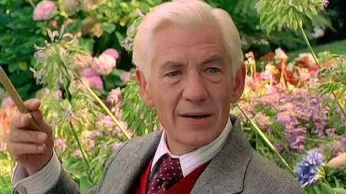
7 hours ago
Sir Ian McKellen, Harvey Weinstein, and the Oscar That Got Away: Revisiting a Queer Hollywood What-If
READ TIME: 3 MIN.
Picture it: the 1999 Academy Awards. The air is thick with anticipation, starched tuxedos, and the unspoken hope that for once, Hollywood might let an openly gay man take home the golden statue for Best Actor. Sir Ian McKellen, resplendent and radiating gravitas, is nominated for his role as James Whale in Gods and Monsters—a performance so nuanced and haunting it practically demanded a paradigm shift in queer visibility on screen. But as the envelopes opened and the world watched, the Oscar slipped through his fingers. For years, the story was one of heartbreak. Now, with Sir Ian’s recent comments, it’s become a story of something more sinister: systemic sabotage.
Speaking candidly, Sir Ian McKellen has accused Harvey Weinstein of “stealing” his Oscar—using his infamous industry muscle to tip the scales against McKellen’s groundbreaking performance. According to McKellen, Weinstein “rigged” the outcome, ensuring the trophy went elsewhere, despite widespread critical acclaim for Gods and Monsters.
McKellen didn’t mince words: “I was set to become the first openly gay actor to win Best Actor, but Harvey had other plans,” he stated, recounting his experience with the kind of dry wit and restraint only a Shakespearean legend could muster. The performance itself—hailed as a triumph by critics and awards groups alike—was overshadowed by backroom dealings that, in retrospect, feel like a microcosm of Hollywood’s broader struggles with LGBTQ+ inclusion.
To truly understand the sting of that Oscar loss, you have to appreciate what was at stake. Gods and Monsters was more than a film; it was a statement, an embrace of queer history through the lens of a forgotten gay icon. McKellen’s embodiment of Whale—a director whose own queerness was both his genius and his undoing—reverberated far beyond the screen. For LGBTQ+ audiences, it was a rare moment of seeing ourselves, complex and unashamed, in a story that refused to be sanitized or shoved in the closet.
Had McKellen won, it would have been a watershed: the first time the Academy crowned an openly gay actor with its most coveted prize. In an era when “Don’t Ask, Don’t Tell” still haunted the American military and Ellen DeGeneres’ coming out was both a triumph and a career risk, this win would have sent a signal—visibility is possible, and excellence cannot be denied. Instead, the moment was lost, not by lack of merit but by a system rigged against queer joy and recognition.
Harvey Weinstein’s shadow looms large over late-20th-century Hollywood, and his alleged manipulation of the Oscars isn’t just a tale of personal disappointment—it’s a reminder of how power brokers have policed queer narratives from the start. By allegedly sidestepping McKellen’s performance, Weinstein upheld the status quo, keeping the Academy’s most hallowed honor out of queer hands for another generation.
This isn’t just about one man or one award. It’s about a pattern of decision-making—who gets to tell stories, who gets to be celebrated, and who is forced to wait their turn while the machinery of Hollywood grinds on. As McKellen himself noted, “This was a story about a gay man, played by a gay man, and the industry just... wasn’t ready.”
So why revisit this now, nearly three decades later? Because history—especially queer history—doesn’t get told unless we insist on telling it. McKellen’s openness is a reminder that LGBTQ+ artists have always had to fight for space, for recognition, for justice. And while the Academy has made halting progress in the years since, true equity remains elusive.
The story also underlines the importance of accountability. As Weinstein’s legacy unravels, the queer community has a chance to reexamine not just the ways we’ve been shut out, but the ways we can claim our own narratives going forward. McKellen’s story is a rallying cry: “We can’t let our victories—or our losses—be rewritten by those who would rather keep us invisible.”
Despite the loss, Gods and Monsters endures as a cornerstone of queer cinema—a film that dared to center a gay man’s pain, artistry, and humanity at a time when such stories were rare. For every LGBTQ+ person who’s ever wondered if Hollywood is really ready to celebrate our stories, McKellen’s experience is both a warning and a source of hope. Our history is filled with near-misses, but it’s also filled with resilience, brilliance, and the kind of star power that refuses to be snuffed out.
So, as awards season rolls around again and the red carpets unfurl, remember: every queer story matters, every queer triumph is hard-won, and sometimes, the real victory is in daring to show up at all. As McKellen proved in 1999 and continues to prove today, authenticity isn’t just radical—it’s revolutionary.






